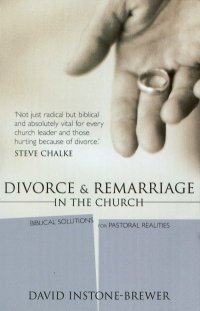

|
Questions & Replies about
Divorce and Remarriage | ||

|
Pastoral support doesn't really work by email, so if you need this, I'd encourage you to find a local fellow Christian or minister. Their personal views on this subject don't matter too much if they are good at listening, both to you and to God. David Instone-Brewer |

|
| Emailed question/comment: | ||
|
Thank you for your compelling book on divorce and remarriage in the church. I have devoured it over the last three days in between work. My husband and I have long held the view that if somebody continuously and unrepentantly breaks their wedding vows the innocent party should be released from the marriage. So it was very helpful for us to see the biblical foundation for our belief system. Even more exciting was reading your views on obey. We have also believed for a long time in egalitarian marriage and mutual submission and I think your position about both partners agreeing to obey is sound - if it must be said at all - but I prefer the idea of a commitment to mutual submission. I have a question and a suggestion - not an original suggestion but one that really opened my eyes when I read it but first the question. What I omitted earlier is that my husband and I have been senior ministers in the past and are just about to start a new work. In the mean time we have continued to minister to a lot of disenfranchised people and those who have maintained a pastoral or "mentoring" relationship with us. I am personally "mentoring" four women in difficult relationships and my question is one about forgiving the offending partner when they "repent". How long do you keep forgiving? And what happens when you forgive and the abuse escalates? I dont know quite how to deal with this because it seems to require judging the sincerity of the offender's "repentance" (I say that advisedly as more often than not it seems to be remorse - and I say that as the offender rarely does more than say they are sorry, act like the perfect partner for a few weeks and slowly slide into the abusive behaviour again, taking it that bit further each time). I do feel that fruits of a persons life tends to be their judge in any case and being a continuous abuser does suggest a lot about their sincerity. It seems easier to help a woman draw the line if she or her children are in physical danger - it is much easier to counsel - on the basis of safety and the fact that the offender is also breaking the law - for the woman to remove herself and insist on the offender getting serious help and intervention and if they wont/dont change the innocent party can divorce. But when it is an escalation of nastiness and mean spiritedness or not doing the right things financially it is much harder to help them draw the line. Most of the women I am ministering too would struggle at the best of times - based on the heritage of beliefs from being "churched" into believing divorce is not allowable for Christians to draw the line and say enough is enough. When their partner is seeking constant "forgiveness" it makes it even harder for them to say no you have done this too many times. I would appreciate your thoughts on this - do I just leave them to it or do I help them to draw a line? Along the lines of helping people to draw the line in neglectful and abusive marriages, I have come to the conclusion that we should apply Matthew 18:15-17 albeit most churches may struggle on the basis of the views they hold of a womans place in marriage to hear the woman and deal with an aberrant husband. Nevertheless I think the idea of a woman first confronting the husband, seeing what happens and if there is no change then taking witnesses with her to deal with him and if there is still no change taking it to the church. If there is still no change then I believe a woman has done all she can do and is free to leave. The bible gives this as instructions for resolving grievances between brothers and sisters in Christ and I think it should apply to husbands and wives as well. As I said this is not an original idea I read it in a book called Men and Women in Church by Dr Sarah Sumner, PhD (chapter 16, pages 191- 206, publisher InterVarsity Press, published in 2003) although she wasnt applying it to divorce but to solving issues with a marriage partner. I think people need to have a process and to know that it is biblically backed. I guess the only difficulty here is how does it sit with forgiving your brother 70 times 7 if he sins against you? I do think you give some clues when you discuss an offending partner wanting to remarry. Your advice seems to be for the offender to seek forgiveness from the partner they have hurt and if the innocent party is willing, reconcile. Inherent in this advice it seems that the innocent party can choose whether to reconcile and that it is okay for them to say no. Would it be fair to say that the innocent party must forgive the offender but that they can still choose not to go back into a relationship with that person? In other words you can forgive the offender but you might still uphold the consequence of their behaviour. |
||
Reply: | ||
|
Thank you for your encouragement and for a most interesting question, to which you have evidently given much more thought than I have. It sounds like you are nearer the front line, so to speak, and you have a very clear insight into the problems involved. The only guidelines which I have found in the Bible are the example of God divorcing Israel and Jesus' teaching on 70x7 (which you mention). I like the distinction which you make between 'repentance' and 'remorse' and I suspect the solution lies in discerning the difference between the two. Repentance includes a change in behaviour as well as contrite apology, though sometimes someone who sincerely repented falls again into the same sin - and although God can no-doubt tell if the original repentance was genuine, it is often difficult for us. How does the 7x70 work? If the suffering for us is minor, we can go on forgiving, but how many times can you continue to accept physical harm? To take it to the extreme, how many times do you let someone get drunk and shoot at you and miss? I think I'd say that you forgive him if he repents, but if he gets into a drunken temper again, you don't hang around to see if he picks up his gun. And if the repeated offence is adultery, who can expect a marriage to survive 490 mistresses! So the answer isn't in numbers, but in attitude. Sin does repeat, and forgiveness has to be given more than once, and if you are convinced that someone is really trying, and you can stand it, Jesus tells us to keep on forgiving. But in the end those offenses will kill the marriage, and the only person who knows when the end has come is the injured party. Ezekiel listed the marriage vows which Israel had broken (unfaithfulness, giving God's food to idols, clothing them with the expensive cloth which God gave Israel, and giving her love to them) but Ezekiel didn't start counting them the number of times Israel broke them. God warned and forgave many times in the prophets, and finally he ended the marriage, and the only clue we have about the timing of this is the word 'hardhearted' which Jesus cites. Jesus cites the word 'hardhearted' from Jer.4.4. We know he is quoting the OT because 'hardhearted' is a word which only occurs in the Bible - it doesn't occur any where else in Greek literature because it was invented by the team which translated the Hebrew Bible into the Greek Septuagint version (ie the 'LXX') about 200BC. This was the Bible used by Greek-speaking synagogues, so when Jesus' words were translated into Greek, they used the Greek version of the Bible for his OT quotes. The word 'hardhearted' occurs many times in the LXX, but only once in the context of divorce or marriage, which is at Jer.4.4 The LXX of Jer.4.4 reads: "Circumcise yourselves to your God and circumcise your hardness of heart, you men of Judah". In the Hebrew OT this is: "Circumcise yourselves to the LORD and remove the foreskin of your heart you men of Judah". The translators decided that "foreskin of your heart" should be interpreted as "your hardness of heart" - ie 'stubbornness' or 'obstinancy'. This is a good interpretation of the phrase in the context in which it occurs. Jeremiah is giving Judah God's final warning, that if they don't repent they will be exiled like Israel was, which ultimately resulted in God divorcing Israel (as Jeremiah pointed out in chap.2-3). The language at the start of Jer.4 is particularly interesting
with regard to the practical problems which you are coming up
against, because we can see how God presents to them their 'last
chance'. Of course they didn't, and God sent Israel into Exile, and now
Jeremiah warns Judah not to follow the same path, so he says: The imagery of this needs some unpacking for us modern-day
townies. The other imagery here is that of a covenant or contract. In v.1 they make a new contract with God - and they are told that if they promise something they must also DO it. In v.3 the contract is compared to the contract which each Jew has with God, as symbolised by their circumcision. God says through Jeremiah that this circumcision isn't complete if it doesn't include their heart. The last bit of imagery which is difficult for us modern readers to appreciate is the 'heart' which was not the seat of the emotions in the ancient world, but the seat of the intellect. So, what is Jeremiah saying? "If you are repenting, you must turn around, plough up your stubborn minds and not waver". Or, to use modern imagery: "If you are repenting, you need to do a U turn, get your mind into gear and stick on that route" - otherwise it isn't real repentance. In other words, in the area of broken marriage vows there is a clear way to see whether someone is repentant or just remorseful - by seeing what they DO. If they say they have repented of their adultery or abuse and they go back to it, then it is fairly certain that this wasn't repentance. Remember, forgiveness, as Luke 17.3-4 says, should be contingent on repentance. You can forgive someone in your heart, to prevent bitterness from taking over your life, but without their repentance you cannot extend that forgiveness to the person themselves (ie let them off the consequences of their offence), because otherwise evil will triumph. |
||
Read more emails & replies... | ||
Version
-for ministers
-for academics
-for everyone
Summary
Reviews